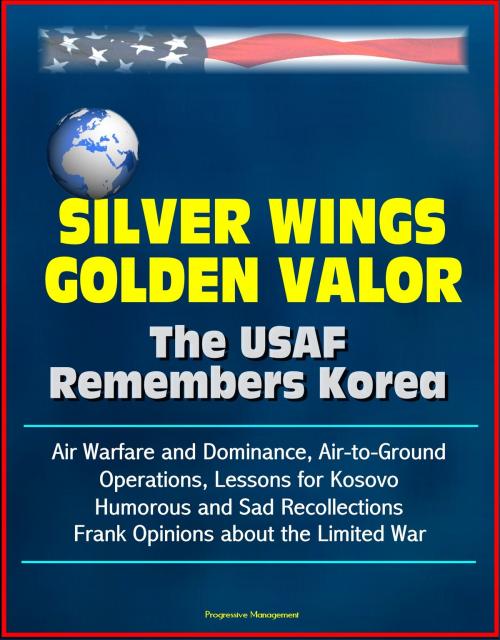Silver Wings, Golden Valor: The USAF Remembers Korea - Air Warfare and Dominance, Air-to-Ground Operations, Lessons for Kosovo, Humorous and Sad Recollections, Frank Opinions about the Limited War
Nonfiction, History, Asian, Korean War, Military, Aviation| Author: | Progressive Management | ISBN: | 9781311799395 |
| Publisher: | Progressive Management | Publication: | August 9, 2015 |
| Imprint: | Smashwords Edition | Language: | English |
| Author: | Progressive Management |
| ISBN: | 9781311799395 |
| Publisher: | Progressive Management |
| Publication: | August 9, 2015 |
| Imprint: | Smashwords Edition |
| Language: | English |
Professionally converted for accurate flowing-text e-book format reproduction, this Air Force publication presents the proceedings of a commemorative symposium at the U.S. Congress on the Korean War.
Sadly, of all the aspects of that little-appreciated conflict, perhaps the least appreciated of all is the air war. Indeed, with Korean veterans at last receiving just recognition of their accomplishments, it is remarkable to the degree that the Korean air war is the one aspect of the Korean War that continues to receive far less attention than it should. For example, almost all the publicity surrounding the fiftieth anniversary of the Korean War - and particularly the speeches of national figures on the June 25, 2000 kickoff at the Korean War Memorial - have stressed the struggle on the ground, with air power either escaping mention, or mentioned only as if it were some sort of sideshow. In fact, even in terms of the land struggle, much of the commemoration has been cast in terms of the bitter fighting surrounding the retreats in the face of Chinese intervention in November-December 1950, which was but one campaign in a war of many. Such a narrow focus makes as much sense as commemorating America's role in World War II in terms of only Bataan or Kasserine, without mentioning Normandy or the smashing of Japanese militarism, Italian fascism, or German Nazism.
Much of this ignoring of the air dimension may simply reflect the innate failure by many to appreciate how air power has transformed America's national security over the last century. The transformation has been so rapid that one feels it is often reflected more accurately by the popular perception of the average citizen than it is in official doctrinal thinking with its often-too-traditionalist and established hierarchy of hoary and questionable "truths." Indeed, for over the last fifty years, it has been America's joint service airmen and air power forces that are the "first to fight." It was certainly true in Korea (where airmen entered combat a week before their ground compatriots), and it has been true in most conflicts since that time, from Vietnam through the Gulf, the Balkans, and on to the post-September 11, 2001 war on terrorism of the present day. In Korea, more often than not, it was the airmen of the U.S. Air Force, the U.S. Navy, and the U.S. Marine Corps who carried the war most vigorously and offensively against the enemy. those same airmen who made the survival of their compatriots on the ground possible.
Chapter 1 * Korea: The Forgotten (Air) War * Chapter 2 * My Memories of the Korean War * Chapter 3 * Learning from the Korean War * Chapter 4 * The Air Force, Korea, and Kosovo, Past as Prologue * Chapter 5 * Air Dominance: The Essential Achievement * Chapter 6 * Air Pressure: Air-to-Ground Operations in Korea * Chapter 7 * From Korea to Kosovo, Learning from the Past for the Crises of the Future * Chapter 8 * Closing Remarks
Professionally converted for accurate flowing-text e-book format reproduction, this Air Force publication presents the proceedings of a commemorative symposium at the U.S. Congress on the Korean War.
Sadly, of all the aspects of that little-appreciated conflict, perhaps the least appreciated of all is the air war. Indeed, with Korean veterans at last receiving just recognition of their accomplishments, it is remarkable to the degree that the Korean air war is the one aspect of the Korean War that continues to receive far less attention than it should. For example, almost all the publicity surrounding the fiftieth anniversary of the Korean War - and particularly the speeches of national figures on the June 25, 2000 kickoff at the Korean War Memorial - have stressed the struggle on the ground, with air power either escaping mention, or mentioned only as if it were some sort of sideshow. In fact, even in terms of the land struggle, much of the commemoration has been cast in terms of the bitter fighting surrounding the retreats in the face of Chinese intervention in November-December 1950, which was but one campaign in a war of many. Such a narrow focus makes as much sense as commemorating America's role in World War II in terms of only Bataan or Kasserine, without mentioning Normandy or the smashing of Japanese militarism, Italian fascism, or German Nazism.
Much of this ignoring of the air dimension may simply reflect the innate failure by many to appreciate how air power has transformed America's national security over the last century. The transformation has been so rapid that one feels it is often reflected more accurately by the popular perception of the average citizen than it is in official doctrinal thinking with its often-too-traditionalist and established hierarchy of hoary and questionable "truths." Indeed, for over the last fifty years, it has been America's joint service airmen and air power forces that are the "first to fight." It was certainly true in Korea (where airmen entered combat a week before their ground compatriots), and it has been true in most conflicts since that time, from Vietnam through the Gulf, the Balkans, and on to the post-September 11, 2001 war on terrorism of the present day. In Korea, more often than not, it was the airmen of the U.S. Air Force, the U.S. Navy, and the U.S. Marine Corps who carried the war most vigorously and offensively against the enemy. those same airmen who made the survival of their compatriots on the ground possible.
Chapter 1 * Korea: The Forgotten (Air) War * Chapter 2 * My Memories of the Korean War * Chapter 3 * Learning from the Korean War * Chapter 4 * The Air Force, Korea, and Kosovo, Past as Prologue * Chapter 5 * Air Dominance: The Essential Achievement * Chapter 6 * Air Pressure: Air-to-Ground Operations in Korea * Chapter 7 * From Korea to Kosovo, Learning from the Past for the Crises of the Future * Chapter 8 * Closing Remarks















